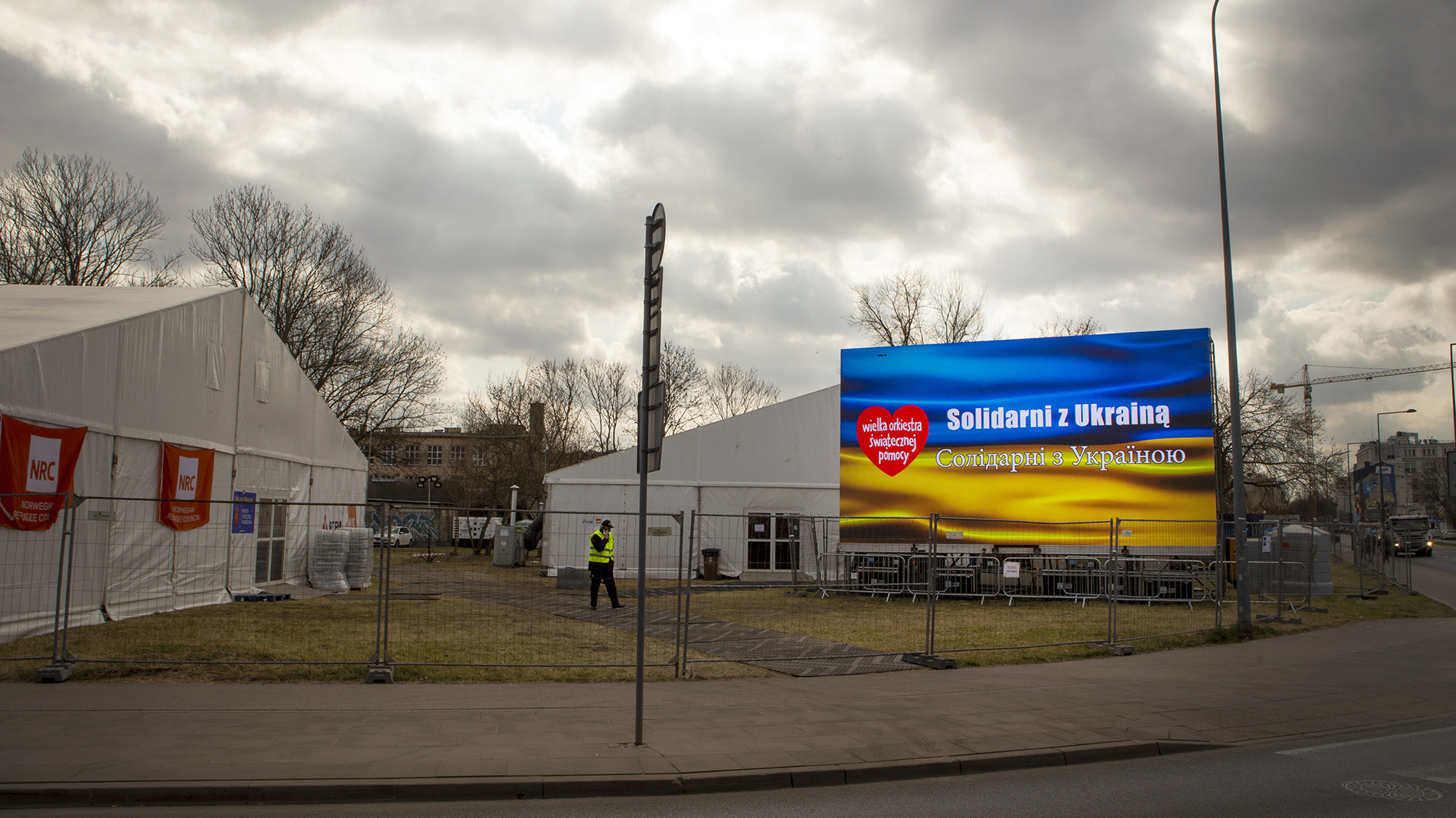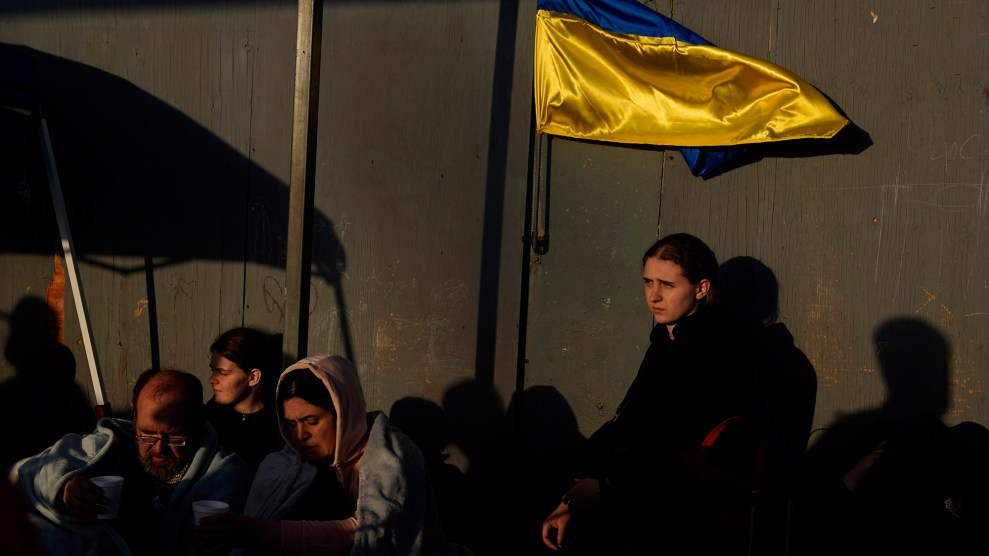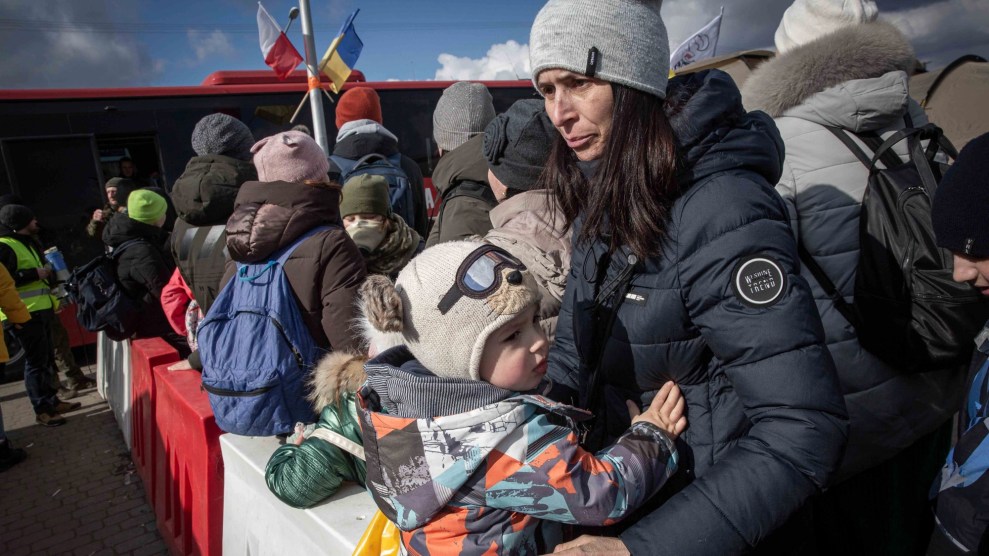She hadn’t even reached the border when she felt her teeth crack. Diana Kyrychyk had just finished getting a root canal in Ukraine the previous day, but she still had four temporary fillings that needed to be replaced and now they were disintegrating. She pulled two bits of broken teeth from her mouth, carefully tucked them into her front jeans pocket, and kept moving. On a crowded road in northwest Ukraine, she was fleeing Russian missiles by foot with two suitcases, her husband, her sister, her three young children, and her 6-month-old niece.
At around five in the morning three days earlier, on Thursday, February 24, Diana was asleep in her apartment in Kyiv when she was awakened by the sound of explosions. She realized that, as unbelievable as it had seemed only days before, the Russian army was dropping deadly mortar shells on the country’s capital.
Diana and her husband, Dima Kyrychyk, packed up their essentials—laptops, documents, winter boots, medication, sandwiches, some toys for the kids. They loaded up the gray Citroën sedan they’d bought in 2013, soon after their wedding. They asked their children—Evangeline, 7, Oskar, 5, and Oliver, 3—to be obedient and attentive because anything could happen, even to their parents, and it was extremely important to listen and follow instructions.
For more articles read aloud: download the Audm iPhone app.
They drove toward her parents’ house in Volhynia, about 100 kilometers from Lviv and only 20 kilometers from the border with Belarus. A drive through the Rivne region that normally takes six or seven hours took 15. Along the road, they saw tanks and Ukrainian soldiers. They managed to make only two pit stops so the kids could use the bathroom. Their trusty Citroën was fuel-efficient, so they didn’t need to wait in the long lines for gas.
Diana alternately cried and prayed for God to save them from explosions. “Every minute we were afraid of missiles,” she says. On February 26, two days after the Kyrychyks crossed over it, the bridge they took to leave the region was blown up by Ukrainian troops to prevent the Russian army from getting any closer to Kyiv.
At 3 a.m. on February 25, they arrived at her parents’ house, imagining they would be safe in western Ukraine. But then Belarus became a launching point for Russian missiles. Over the next couple of days, they heard explosions several times. They sheltered in the basement. For the kids, it was like a game.
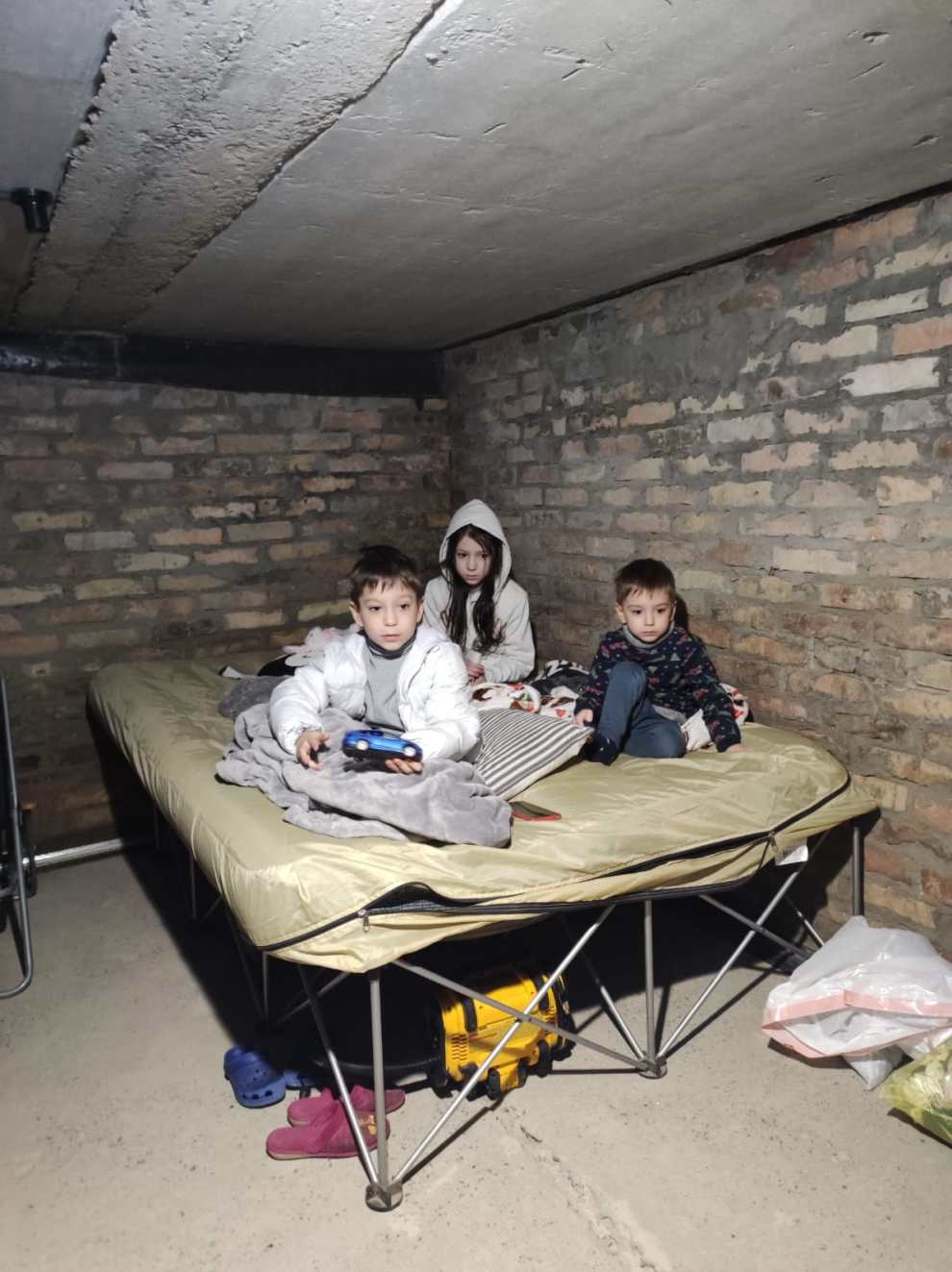
Oskar (5), Evangeline (7), and Oliver (3) Kyrychyk hiding in the basement in Western Ukraine.
Diana Kyrychyk
“It was fun for them just to go deeper into the basement,” says Diana. “They didn’t see these explosions very close.” Diana, Dima, and the family weren’t at her parents’ house for long before they begged Diana to take her family and escape from Ukraine.
On the morning of Sunday, February 27, Diana and Dima decided to leave. At that time, people traveling by car were waiting in line for 24 hours or longer to cross over the border to Poland at Dołhobyczów-Uhrynów, the closest border crossing about 20 miles from where the Kyrychyks were staying. Diana and Dima realized they would have to cross by foot.
They were going to be traveling with Diana’s sister-in-law, Tanya, and her daughter. “We just packed up everything we have in 30 minutes,” Diana says. They fit all the clothes, toiletries, and other items for this clan of seven into two suitcases. She gets tears in her eyes thinking about all the treasured belongings she left behind in Kyiv. “I was thinking that perhaps it will not take a long, and we will be back soon. I really left a lot of my precious things because I was thinking, ‘OK, I will be back, and I will enjoy them.’”
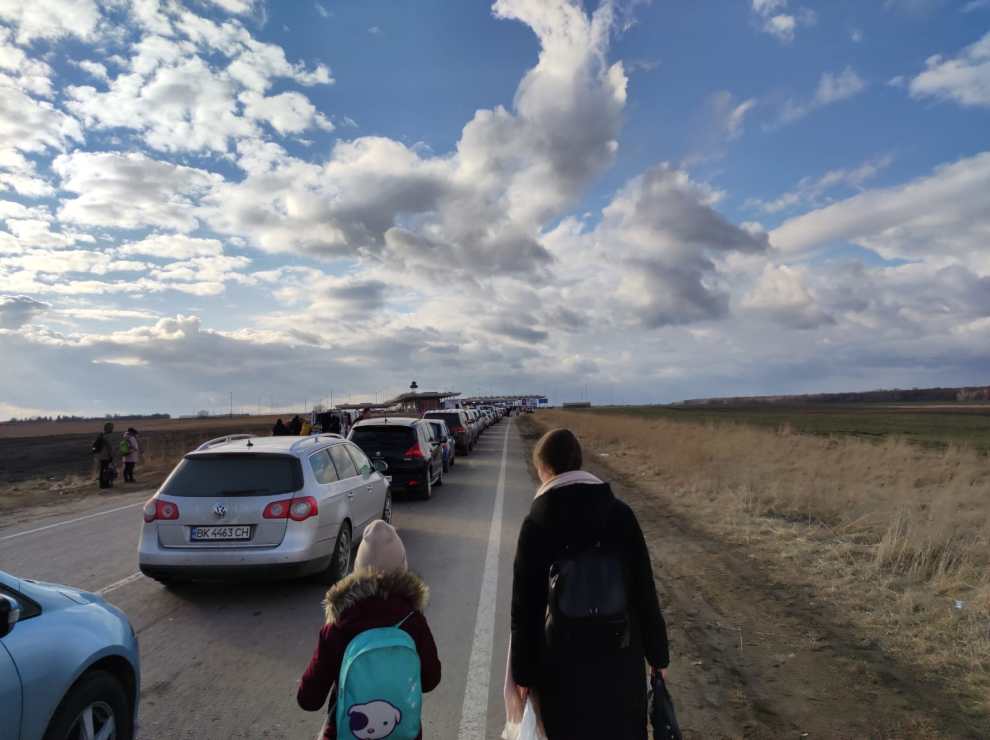
Evangeline and her mom, Diana, walking by foot to the Polish border. The crossing point is in sight.
Diana Kyrychyk
It took three-and-a-half hours to walk to the border. They passed by other families and lone travelers and groups of adults who also opted to go by foot. The only reason they were able to move so quickly was that with three small children and a baby, fellow refugees kept letting them ahead in line.
Dima would be allowed to cross the border because he has three or more children, which exempts him from the mandatory conscription for all men in Ukraine between 18 and 60 years old. Tanya’s husband, the father of her small baby, had to stay and fight. Migration officials checked their Ukrainian ID cards and waved them through.
They had made the decision to go to Poland so quickly that they didn’t have anything lined up—no housing, no transportation from the border. Diana dreaded the idea of standing outside in the cold for hours with the kids at the border crossing as the adults tried to sort out their next steps.

Neither Diana nor Dima nor Tanya had any friends or family in Poland when they decided to cross the border. They stayed at the makeshift refugee reception center on the border for a few hours. It was surrounded by many tents and buses and cars, and people running around, trying to help out. Diana works as a software engineer for a company based in Gdańsk, a mid-sized city on Poland’s northern border. Her colleagues had been encouraging her to leave Ukraine as soon as the war started, but she told them she was going to stay with her parents. Once she was over the border, she almost casually let her teammates know that she had arrived in Poland.
One of her colleagues contacted a friend, an older Polish man named Artur who lives in Zamość, who was driving to the border and transporting refugees across Poland to various communities where family members, friends, or volunteers were waiting to take them in. Diana received a call on her Ukrainian phone number from Artur’s daughter, who spoke English and told her that her father would pick them up around 9 p.m. He picked them all up and drove eight hours straight to Gdańsk, where he deposited them at Diana’s office. They all ate breakfast together, then at 6 a.m. he turned around to drive back to the border and transport more people.
Volunteers like Artur have formed the backbone for moving people on the border. A Facebook group called “Grupa transport – UA/PL” has more than 34,400 members. Multiple times an hour, people post asking if someone could drive, say, two women from Kherson to Poland, or a woman and five cats from Przemyśl (near the Polish border) to Kraków, or deliver a package of food from Poznan to a starving family in Kyiv.
Other refugees have been taking the train, a service they use for free thanks to the March 12 law—a comprehensive immigration measure passed by the Polish Parliament granting special treatment for Ukrainian refugees. It makes it possible for Ukrainians who have arrived after February 24 to stay in Poland without a residence permit and allows those whose permits have expired to have them extended by 18 months. The law also offers free transportation for Ukrainian refugees. Many travel to or through Lublin, the largest city in eastern Poland, a city whose population has grown by about 10 percent. Every day an overnight train that travels the nearly 500 miles from Kyiv to Warsaw arrives at around 2 p.m., bringing more people to Poland’s capital.
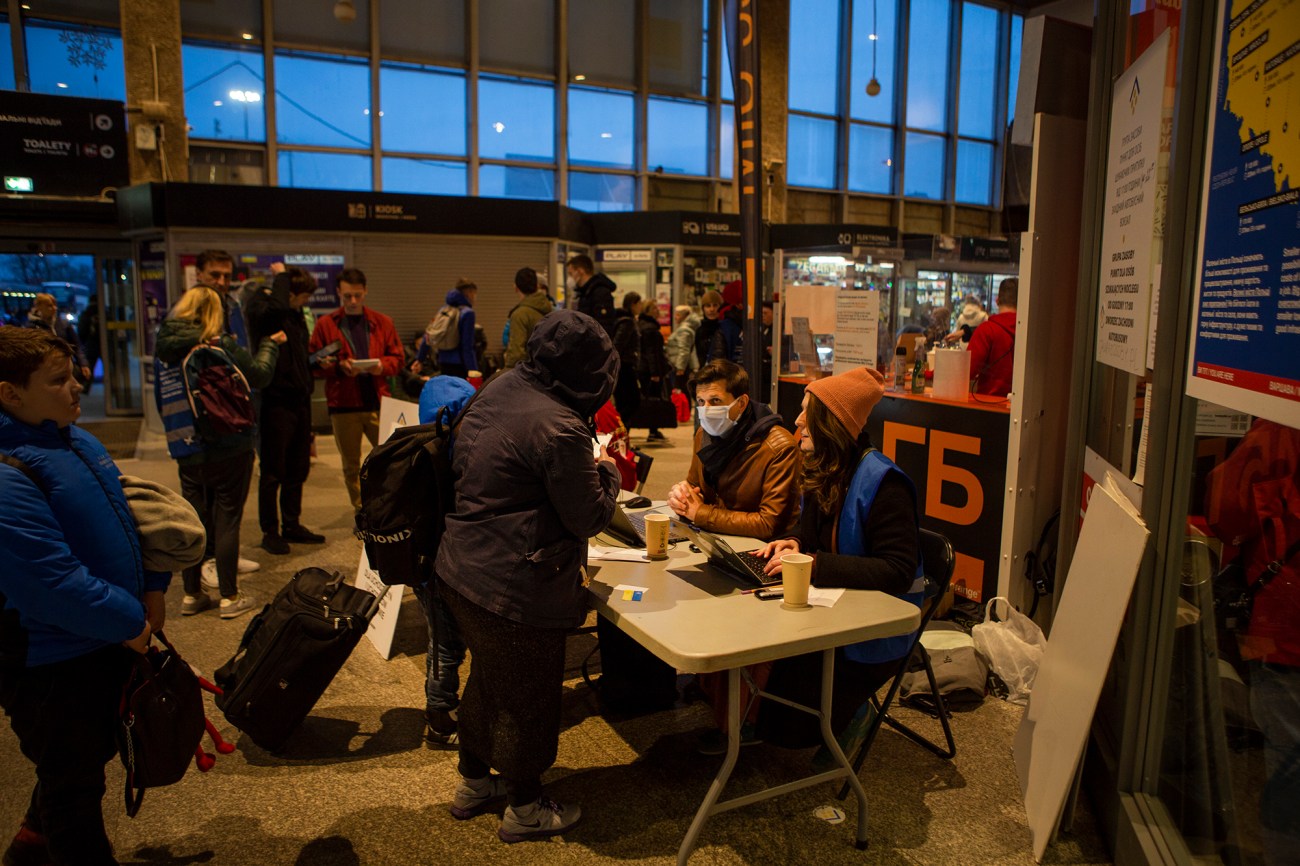
Grupa Zasoby providing refugee services at Warsaw’s West Station.
Peter Balonon-Rosen
Since February 24, more than 300,000 refugees from Ukraine have arrived in Warsaw, and more are coming every day. The city’s population has grown by about 17 percent since the conflict began. But instead of any swift government humanitarian response, almost immediately, volunteer groups sprang up to coordinate how to host them. And the volunteer groups have formed the infrastructure of the relief ever since. But with unpaid volunteers shouldering the massive burden of the relief efforts, many are asking how long that can last. And as NGOs and local governments step in to help, they are battling a national government that has been openly anti-immigrant for a long time.
That’s how Grupa Zasoby, which translates roughly to “Resources Group” in English, began. “People from Ukraine who come here don’t know what to do, we can get them a place to stay for a while,” says Justyna Fogler, a volunteer in charge of coordinating the group’s presence at Warsaw’s western railway station. When we met in the evening on March 31, she was wearing a blue volunteer vest with the group’s name printed on the back and commandeered a laptop at one of three picnic tables set up inside the station.
“At the beginning, everyone was just running around like crazy and trying to do something,” says Fogler. Her friend Zofia Jaworowska started the Facebook group immediately after the war started. It was a place where people could post if they had room to host refugees. On February 25, Zofia held a meeting at her apartment where 30 to 40 people appeared to volunteer. They decided to go to the train station, Fogler says, and “just started doing stuff” like setting up some tables with laptops to coordinate aid. That day, about 5,000 people were due to arrive from Ukraine on three separate trains. One volunteer stayed in the apartment with a laptop and called up hosts to match them with refugees as they arrived at the station. That night, they found housing for 30 people.
The Facebook group quickly grew to tens of thousands of people, so a friend coded a website and database where people could fill out a form if they were either looking for housing or had space to host people. They also organized a volunteer taxi service of people with cars who were willing to drive refugees from the station to their new accommodations.
At the beginning of the crisis, Grupa Zasoby was finding housing for about 300 people a day—mostly the temporary kind on someone’s couch or spare room. Now that number has slowed to about 100 a day. “The first week was completely crazy,” says Fogler, who spent what seemed to be every spare minute at the railway station. “We pretty much didn’t eat and sleep.” Then local governments started sending refugees their way, a circumstance Fogler describes as “pretty weird, but it’s also better for those people.” She explains that the government will only send refugees to group shelters instead of to someone who hasn’t been officially verified. But the excess of caution and bureaucracy overlooks how this could be an opportunity for refugees to receive personalized care and some renowned Polish hospitality. At the same time, there have already been reports of women being sexually abused by volunteer hosts.
At its best, Fogler says, “It’s not like just a place to sleep, but someone who will help you get a visa, look for a job, for a long-term apartment. Someone local who helps people stand on their two feet and start something for themselves here.”

Volunteers carry bags at a refugee reception center at Warsaw’s East Station.
Peter Balonon-Rosen

In late March, the city government of Warsaw started rerouting trains from Ukraine to arrive at Warsaw’s East Station, instead of Warsaw’s Central Station or West Station, which had become chaotic hubs in the city center where arriving refugees had to navigate through crowds of people to find help.
East Station is across the river in Praga, a more residential, more hipster part of town. This is where the Soviet army stood and watched the Nazis level Warsaw before marching in and occupying the city themselves. Five to six trains a day have been diverted to this station because on March 25, the city of Warsaw partnered with two NGOs— the Norwegian Refugee Council (NRC) and the Polish Center for International Aid Foundation (PCPM)—to organize the first refugee reception center and transit site in Warsaw that is officially managed by a partnership between the NGOs and the city government. The center sits inside a large white tent, with a cluster of auxiliary tents surrounding it. A huge abstract mural of the Polish Pope John Paul II gazes down on the complex from a nearby building.
I visited on March 28, and the reception center was busy yet calm. When I opened the doors of the tent to enter, I was blasted by the aroma of a hot meal—potatoes, chicken, and soup, with a vegetarian option available. The city of Warsaw provided the land for the site, funded by the Norwegian group, and the Polish aid organization is in charge of day-to-day operations. They currently have funding for the next three months, but they’re hoping to extend it.
The first stop for most refugees who enter is the free SIM card booth so they can access their phones and get in touch with family in Ukraine. There was a short queue in front of the tables for the Open Dialogue Foundation, which runs a database of registered accommodations and transport abroad to countries like Germany, Sweden, and Canada. Two massage therapists were giving out free massages, and children were shyly picking at the toys in a small play area. Three little boys were excitedly kicking a mini soccer ball around the hall. A magician showed up to entertain some kids with card games.
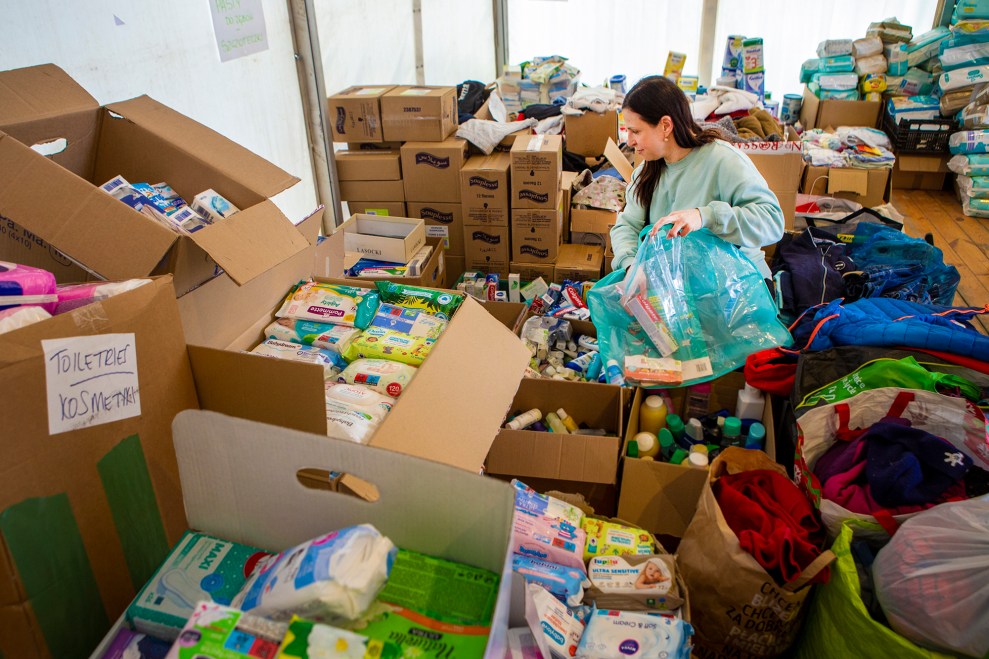
Toiletries at the refugee reception center in Warsaw.
Peter Balonon-Rosen
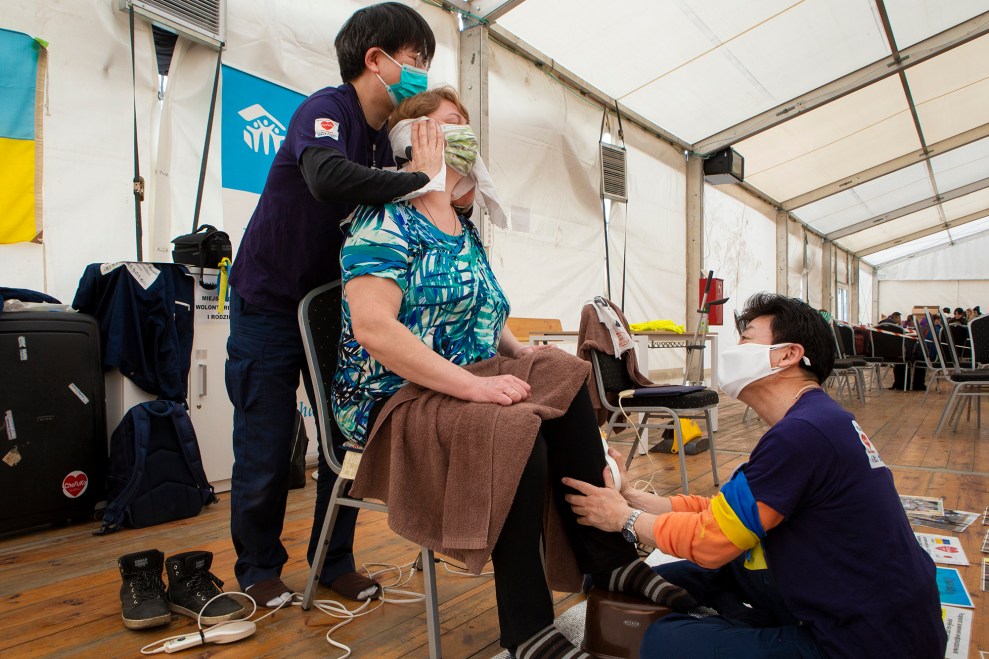
Massages at the refugee reception center.
Peter Balonon-Rosen
Joanna Nahorska, the NRC global media adviser and a Warsaw native, normally works out of Brussels, but when the refugee crisis hit Poland, she hopped on a train to Warsaw with her French bulldog puppy to help set up her organization’s Polish office. She explained that in comparison to individual volunteer efforts, which operate outside the realm of government bureaucracy, humanitarian organizations need to register and go through a vetting process. “We can’t just walk into the country,” she says. Nahorska has friends hosting refugees, and she has been surprised to see how many of them are matched up randomly. Refugees are hopping blindly into cars and being taken to homes where someone has heard that there is a bed or a couch. Around the corner from the NRC’s reception center is a massive tent with beds that serves as a temporary shelter. It’s a place where they can rest for a few days, Nahorska says, and then use a referral service to find longer-term housing.
“There’s nothing wrong with the volunteer efforts,” says Wojtek Wilk, the president of the PCPM, one of 32 emergency medical teams certified by the World Health Organization (WHO) to operate globally. They are partnering with the NRC to run the reception center. “The challenge is that volunteer efforts by default are short-lived.” Wilk is experienced in these kinds of efforts and has often witnessed the cycle of aid. “This is my humanitarian crisis number 23.” he says. “But never before have we seen so many refugees in such a short period of time.” Syria was half the population of Ukraine, and the outflow of refugees was more dispersed, both in terms of the timeframe and the concentration of refugees in a single country.
PCPM is also handing out cash assistance cards to refugees who have been stranded in group shelters located in converted gymnasiums and sports halls, where the living conditions are poor. Each recipient receives a cash assistance card that is refreshed every month for three months with a stipend for living, with the possibility of continuing after that three-month span if the aid continues. They are also hiring refugees to work as teachers and assistant teachers in Poland’s public schools, where about 700,000 Ukrainian-speaking children are enrolling. Wilk had just overseen the hiring of 50 Ukrainian teachers in Lublin in a single day. The next week, he was planning to manage the hiring of 300 new teachers in Warsaw.
Wilk is already worried about the people who will fall through the cracks, particularly the elderly. Pensions in Ukraine and Poland are quite low, and refugee pensioners won’t receive the child benefit, which pays 500 Polish złoty (about $117) per child per month. To add to their financial squeeze, the prices of already limited housing in Warsaw are skyrocketing. “As a legacy of the Second World War, and due to the enormous level of destruction in Poland, we have a residual shortage of housing units,” says Wilk. Even before the crisis started, Warsaw had an estimated 1.5 million housing units for a population of 1.8 million. NGOs are encouraging refugees to move on from larger cities in Poland to smaller cities, where rent is cheaper and their cash assistance will go further. Dominik Berlinski works for the Open Dialogue Foundation, an NGO founded in 2009 that promotes democracy in post-Soviet states, and started helping connect people with housing on the first day of the war. “After about three weeks it was very difficult to find any new shelters,” says Berlinski. “So now we are focused on relocation to other countries.”
The majority of refugees who only needed short-term accommodations have already moved on to other destinations. As a result, after operating for a month, Grupa Zasoby has closed applications for apartments on their website. “It’s a structural problem with apartments and war,” says Justyna Fogler. “So it’s really above our heads.”
I spoke with Fogler on Grupa Zasoby’s last night setting up tables at Warsaw’s West Station on March 31. It was a bittersweet moment for a group of volunteers who had been working so intensely together and become good friends. Fogler thinks more could have been done if the government stepped in with funding to help. “We’re just a couple of volunteers who are doing this with zero budget,” she says. “They can do much, much, much more. But we’ll see.”

When the driver Artur delivered Diana Kyrychyk’s husband, three kids, sister-in-law Tanya, and Tanya’s baby to her company’s office in Gdańsk, two of her work colleagues, Karolina and Arkady, whom Diana had never met in person before, were there to greet her. They had Polish SIM cards for the adults and a full breakfast spread with traditional Eastern European salad with potatoes and mayonnaise, cheese, bread, and juice for everyone.
After breakfast, Artur left to return to the border, and Karolina and Arkady went off to start work. “When I saw the sun rising, the dawn, I couldn’t believe that it is really safe here, that there will be no missiles,” says Diana. “I was thinking, is it true? Is it really a country where there is no war? We spent only four days in war and I already had this thought.”
Diana and Dima immediately began to plan the rest of their lives. They started calling anyone—colleagues, friends, phone numbers they received from someone at the border—who could help them find housing. But no one knew of an apartment big enough to accommodate seven people.
Dima became more and more stressed. “It is my responsibility that my family should have accommodations, should have food, should have all necessary things for living,” he says. His need to provide for his family prompted Dima to take online classes and make a career shift into software engineering in 2017. Diana followed suit in 2020. They say that the switch to software moved them into Ukraine’s middle class, where they were able to finally afford small indulgences like fish, or nuts, or sweets.
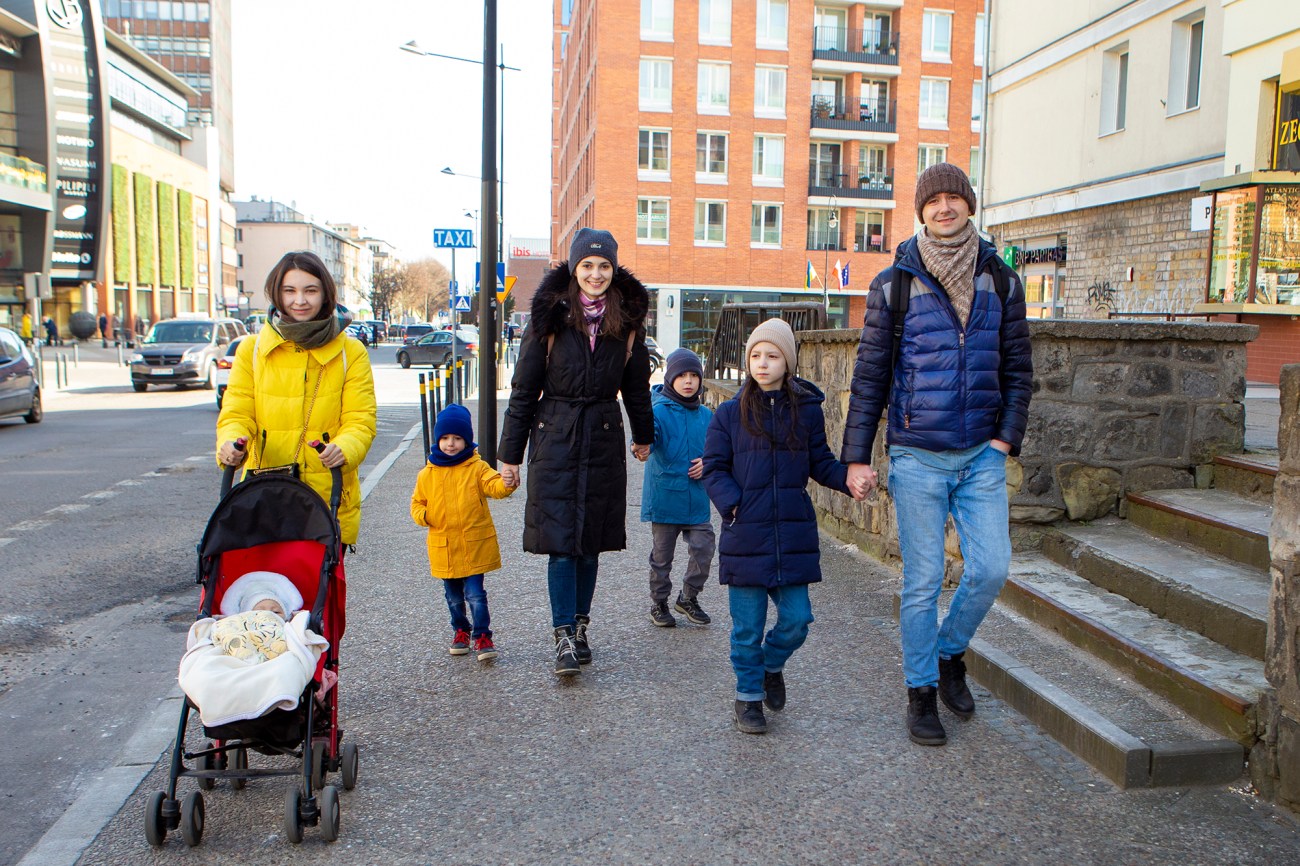
The Kyrychyk family, from left: Tanya and her baby, Oliver, Diana, Oskar, Evangeline, and Dima.
Peter Balonon-Rosen
But then there was another source of concern for Dima; as a fit 34-year-old man with three children, he was able to leave his country while other men, including Tanya’s husband, had to stay behind and fight. He reassured himself by realizing that working remotely for an international company with Western clients who are able to keep paying their bills, may also have benefits for his country. “Support of the Ukrainian economy requires taxes that you can pay if you’re going to work,” he says. Projections are showing that the Ukrainian GDP is expected to plummet by 45 percent this year.
Only 12 hours after Diana had activated her Polish SIM card, she received a call from a random Polish woman who told Diana that she had a great apartment for her family and would be there in 20 minutes to pick them all up. Diana told the woman that her family was exhausted, they would just sleep in the office that night and think it over. But this was not a person who would take no for an answer.
The woman on the phone was Ewelina Sasin. The mother of a 12-year-old son and twin 8-year-old girls, she runs a marketing company and a green tech startup, is very involved in her children’s private school charity, and lives her life in Google spreadsheets. Ewelina has a nickname in Polish that she says doesn’t have an exact English translation, but it basically means “point and shoot.” She is, in other words, a woman of action.
So when the war broke out, Ewelina immediately got to work organizing relief efforts in Gdańsk. She changed the logo on the school charity’s WhatsApp group to a blue and yellow heart. She created a spreadsheet of people who had available accommodations. On February 28, she posted an Instagram story saying: “If someone from Ukraine…needs support, DM me. We have a list of flats and people ready to help.”
She received the first message in response to her story at 6:53 p.m. Someone knew a family with seven people, and no one could find a place big enough for them. Ewelina knew a woman who had recently renovated an apartment that she was planning to rent out but offered to donate it to house Ukrainian refugees instead. Ewelina called Diana at 7 p.m. and had picked up the entire family to bring them to the apartment at 8 p.m.
Diana gets tears in her eyes when she remembers the generosity she received. When they all arrived at the apartment, a centrally located luxury building, she said it truly felt like a miracle. But it was not only the free apartment, but also what awaited them there: toys for the kids, food supplies like eggs, milk, meat, and hygiene items. “Every moment, I feel so touched,” says Diana. When she walked outside and saw the little Ukrainian flags flying on the front of every Polish public transport, all the trams and all the buses, Diana burst into tears all over again.

Neither Diana nor Dima speaks any Polish, so certain things have been difficult to navigate. A Polish neighbor was instrumental in finding a kindergarten with spaces for their young kids. Then there was the issue of Diana’s teeth. She tried to find a dentist in Gdańsk who spoke English, but everyone who was recommended was booked until the end of March. She finally found a dentist who had an opening and was told by the receptionist that he even spoke English.
Unfortunately, the dentist’s English skills had been exaggerated and they were barely able to communicate. She showed him the pieces of her teeth and there followed a complicated transaction which finally resulted in her getting two temporary fillings replaced. Eventually, Diana went to another dentist. Diana and Dima also needed to get their Polish ID numbers, called a PESEL for themselves and their family. The PESEL number is the key to doing anything in Poland: getting a residence permit, enrolling children in schools, receiving the 500 złotys a month of child assistance, opening a bank account, or going to the doctor. The government has set up emergency application centers across the country for Ukrainian refugees, but problems persist.
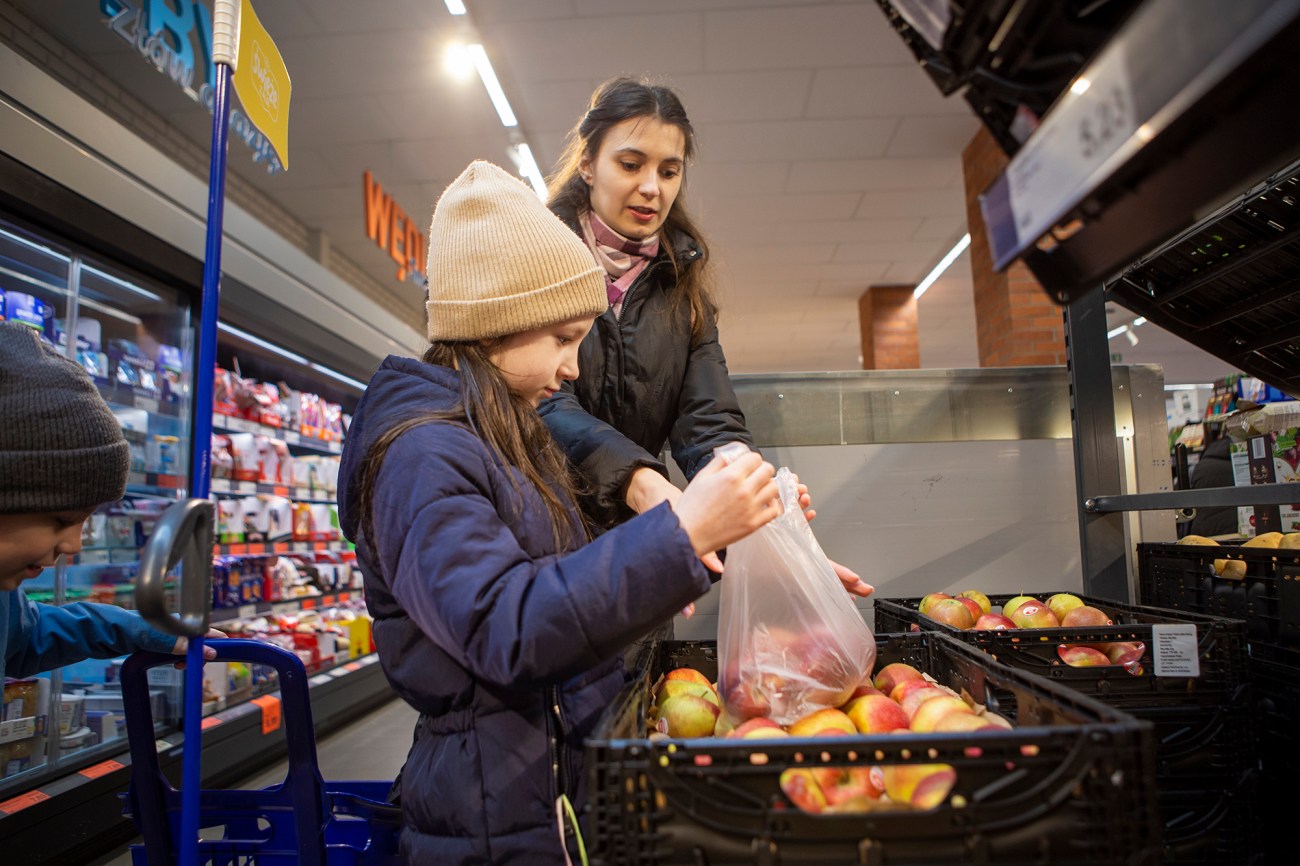
The Kyryck family shopping for groceries in Gdańsk
Peter Balonon-Rosen
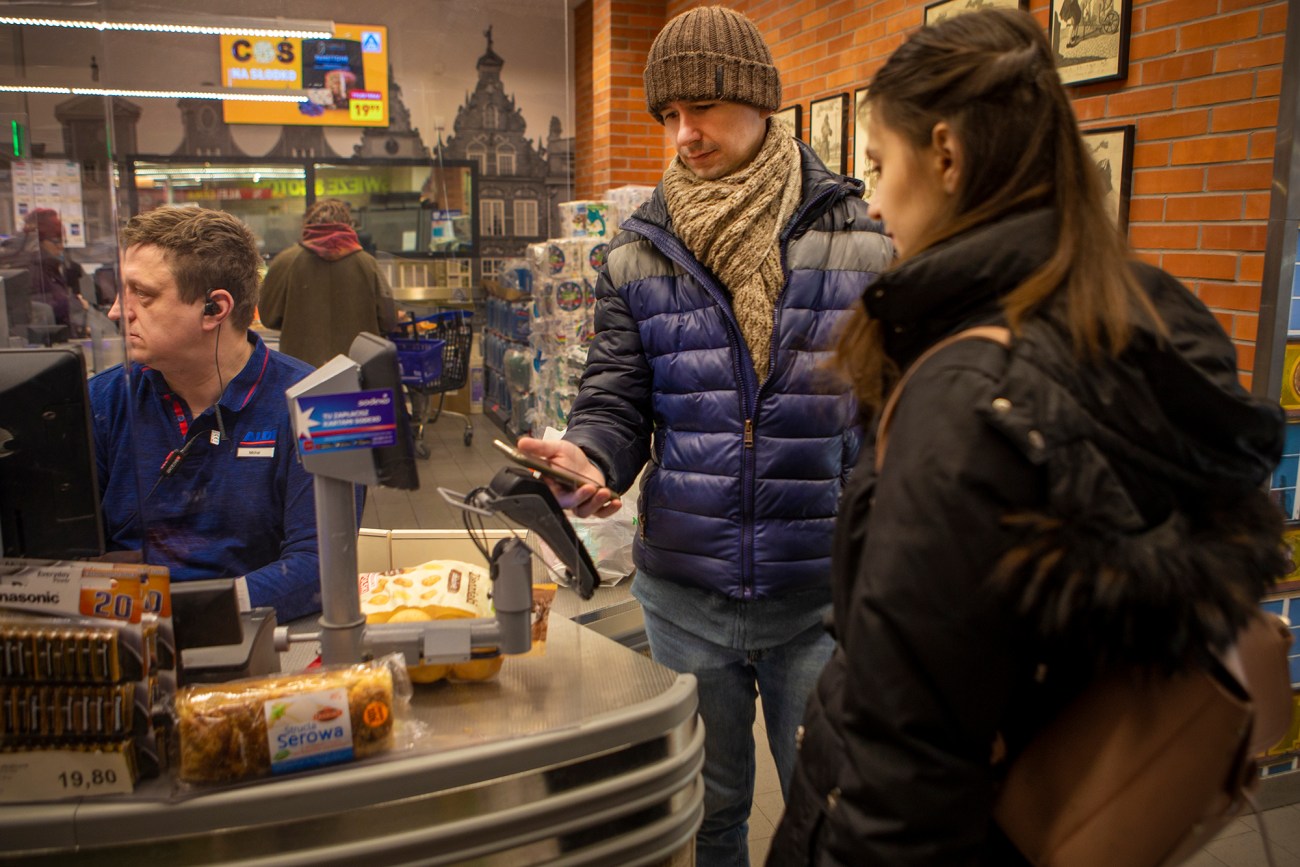
Shopping for groceries
Peter Balonon-Rosen
When Diana and Dima signed up at the center for Ukrainians in Gdańsk, they received a ticket for an appointment on May 11, a full two-and-a-half months after they had arrived. But then they heard that they could wait at the office and see if someone didn’t show up for their reserved time slot. They waited two-and-a-half hours outside the separate office that had been set up for PESELs before getting lucky. A government employee stayed late at work to get PESELs for Diana’s entire family, so they were then able to enroll their kids in school.
According to Poland’s Digital Affairs office, 832,930 PESEL numbers have been administered to Ukrainian citizens fleeing the war since March 16. When I visited the National Stadium on April 12, there were many tables set up and people were receiving their PESELs immediately, with no wait time. But there were barricades left over, indicating how long the line once wound.
Before the war, the process of getting a residence permit in Poland was a complicated tangle of bureaucratic communication and miscommunication. “The documents that were asked for were frequently changing, and frequently local offices interpreted what was required differently,” says Benjamin Cope, an artist and activist who works with Ukrainiski Dom, an organization that offers services for Ukrainian and other post-Soviet diaspora populations in Poland. According to Polish law, applications for residence were required to be processed in three months, but Cope says it was common for it to take up to two years. When people were rejected it was unclear why.
Oksana Pestrykova moved to Poland four years ago to study for her PhD and then applied for permanent residence. She was rejected because there was a document she didn’t include, which she technically didn’t need. Then they lost the rest of her documents. She waited six months to receive a negative decision on her application, and now she has appealed it. She’s been waiting another six months for that decision. According to research conducted by Ukrainski Dom, there were about 1 million Ukrainian migrants in Poland at the beginning of the Covid-19 pandemic. Of those million Ukrainian migrants, only about 200,000 had long-term residence permits and access to social benefits in Poland.
While Poland’s PiS party ramped up its anti-immigrant rhetoric, the realities on the ground in Poland show a contradictory trend. For the last four years, Poland has processed more residency permits than any other country in the EU. In 2020, Poland processed around 600,000 residence permits for immigrants from non-EU countries, about twice as many as Germany. It’s a turning point for Poland, where a strong economy and labor shortage have transformed it from an emigration country to an immigration country.
The new March 12 law could turn out to have been a savvy political move on the part of PiS, argues Mateusz Mazzini. He points out that almost all of the benefits to refugees are actually being implemented by the local city governments, which have been strongholds of Poland’s liberal opposition.
“It is the local government that manages education, it is the local government that manages health care, it is the local government that manages public transportation on a local level,” says Mazzini. “People in Poland are not necessarily used to having their taxpayers’ money being invested into people coming from other countries, so this has enormous potential of creating a backlash—which is obviously in line with the policies of the current Polish government.” His point was that the backlash could potentially weaken the liberal opposition in the cities and reinforce PiS’s power.

Piles of children’s clothes at a free store
Peter Balonon-Rosen

After a few springlike days in mid-March, the temperature in Warsaw dropped back down to the mid-30s in the last week of the month. On March 31, the wind whipped down the Puławska, a wide boulevard running through an artsy neighborhood, laced with a touch of pre-snow frost. Huddling against the wind, a line of about 100 refugees waited to get inside Centrum Pomocy Puławska 20, one of the “free stores” that popped up to provide free clothing and food to refugees. “The queue is huge,” says Karolina Sulej, one of the original volunteers who set up the free shop. “From the very opening to the evening till we close, it’s like 500, 600 people a day.”
Alyona Chmiewska is 26 years old and arrived in Poland on March 7, having fled from Kharkiv, a formerly beautiful historical city and the second-largest city in Ukraine, which has now been laid to ruin by Russian forces. The building where she used to work as a technical support manager was shelled, and it lies half in rubble. She is staying with a friend in Warsaw, who provided her with the checkered jacket she was wearing, a pink scarf with peace signs wrapped around her neck.
She found out about the free store on a webpage with information about help for refugees and despite the cold and how slowly the line was moving, “we are going to wait,” she said. She was looking for shoes, a warm jacket, some personal hygiene products like shampoo, and if she’s lucky, some of the groceries that the store was handing out. She left Kharkiv in a rush and only took a few things. Her priority was to get to the train and escape. “I’m expecting nothing,” she said. “I’m just going to live and try to survive like all of us.”
A little farther ahead in line was Alina Pidhorna, who left Chernihiv, a city in northern Ukraine that was under siege by the Russian army. “It is not safe to be there in our city,” she said. It became impossible to get water, heating, and electricity, and food was becoming more difficult to find. Pidhorna and her 8-year-old son spent the first 22 days of the war living mostly in the basement because they were constantly being bombed by artillery planes. At the first opportunity, on March 17, they escaped, first arriving in Kyiv, and the next day to Poland, where she’s planning to stay for the near future. As she waited, hoping to get some warm clothes for herself and her son, she chatted with a couple of other women. “We came with a small bag and it’s still cold now,” she said. “There is nowhere to return to yet.”
Svetlana Popova is a middle-aged woman who left Sumy, a town in eastern Ukraine, on March 9 because bombs were falling. First, she went to Vinnytsia but when that too became a Russian target, she was terrified and jumped in the car to drive to Warsaw and move in with her 26-year-old daughter. She hopes to return to Ukraine as soon as possible but acknowledges that she might be in Poland for a while.
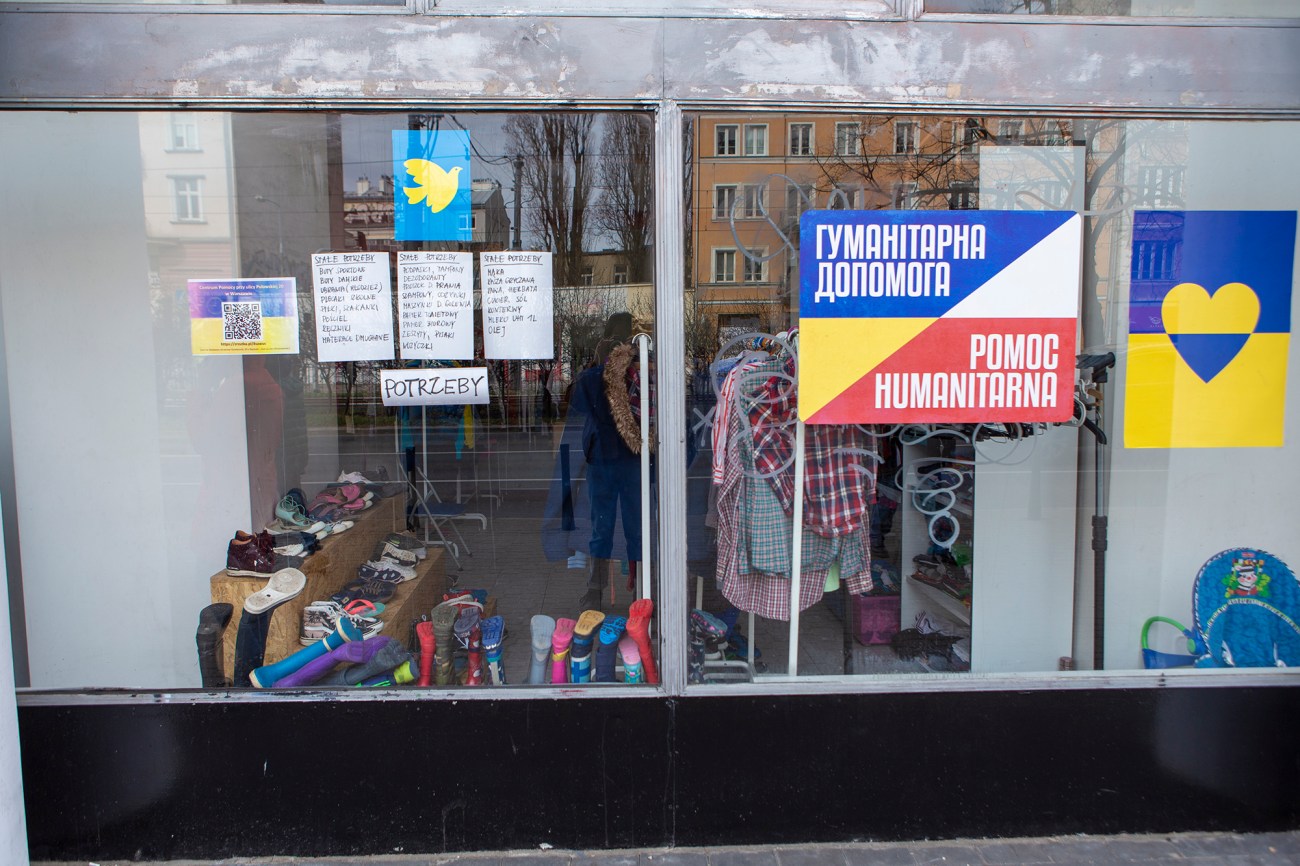
The front of the former movie set that became the free store for refugees
Peter Balonon-Rosen
The site where the free store is located was originally given by the neighborhood’s district council to the Foundation for the Development of Cinematography for use as a movie set. When the war broke out, the cinematography group posted on a neighborhood Facebook group, where people normally give things like books and pierogies away for free, that they wanted to donate the space to help with relief efforts for refugees from Ukraine. Someone suggested that they use it to start a free store.
“The response was immediate and massive,” says Sulej. “Lots of people said, yes, it’s exactly what’s needed here.” The space is in a central location along one of the main roads, and it used to be a secondhand store. The people who volunteered were mostly in their 30s with no experience with humanitarian aid. “Like, none whatsoever,” says Sulej. There are a few artists, an illustrator, and someone who works in banking. Sulej, their self-proclaimed spokesperson, is a writer and fashion anthropologist who has written two books about women’s fashion in Auschwitz.
“It was a ruin, really,” says Sulej. “Graffiti on the glass windows. Holes in the walls. They’re still there, but we covered them.” They had to paint the walls, set up electricity and water, and repair the toilets. They had originally planned to slowly grow their inventory, but then they received a huge truckload of clothes in trash bags from Madrid. Within a week after their first planning meeting, the store was up and running on March 14.

A woman searches for clothes in the baby section of the free store.
Peter Balonon-Rosen
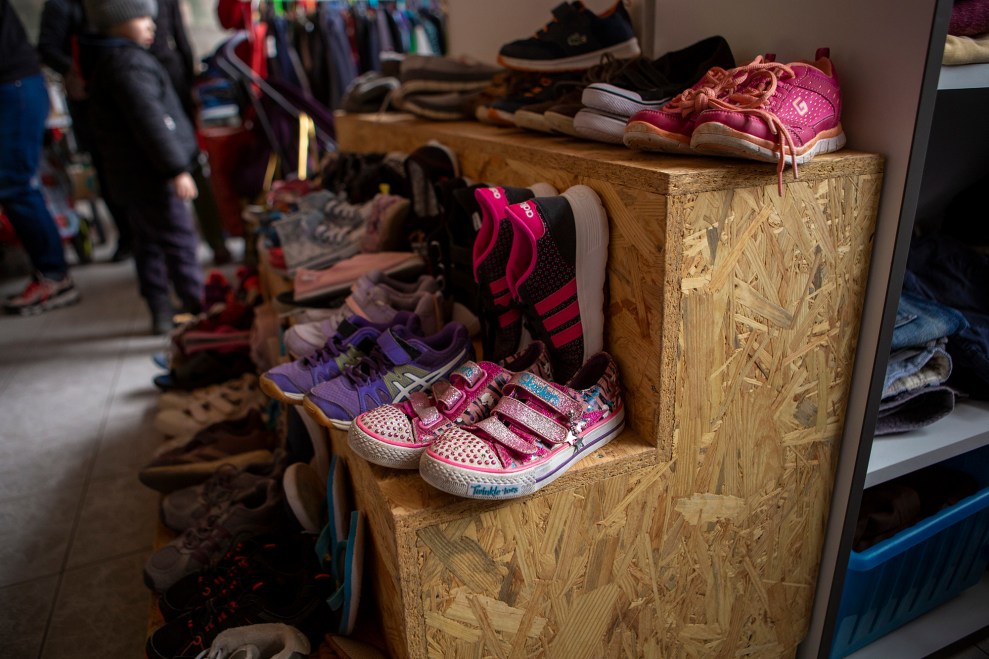
Free children’s shoes.
Peter Balonon-Rosen
The holes in the walls are still visible, but they are mostly obscured by racks and shelves full of donated clothes, organized by size and gender, with men’s clothes in front, women’s along the back wall, and babies and children’s clothes in a far back room. Some items are from individuals, but brands have also made big donations. The other day a company donated 500 brand-new bras, a piece of clothing that is particularly needed. “Every day we publish on our Facebook page and our Instagram the list of needs, specific clothing, articles, cosmetics, groceries so that people could donate,” says Sulej. She has been using her experience as a fashion writer to reach out to brands and get donations, particularly for things like lingerie and cosmetics that need to be new.
Upon entering to the left is a small grocery store run by a volunteer who stands at a counter and takes orders. A volunteer checks at the door to make sure that everyone who enters has a Ukrainian ID card. The space isn’t very big, so they let in 10 people at a time. But of course, this isn’t a department store. After a long wait, some people still left empty-handed—no size 42 sneakers for men, or pants for a seven-year-old girl, or workout pants for a curvy woman.
The women in line with whom I talked never got in. Alyona Chmiewska and Svetlana Popova both waited around three hours before getting too cold and leaving. Alina Pidhorna waited from noon until 6 p.m., when the store closed. She never got in to look for clothes, but volunteers brought her some groceries.
Sulej says they are trying to secure a bigger space. “We are all by ourselves,” she explains. “We have no support from some local city council, or from the government, although they are telling us that they’re observing and appreciating what we do, and they’re still thinking about how to help us.”
One of the founders of the free store, Sveta, is originally from Ukraine, but she’s lived in Warsaw for the last seven years and calls this city home. She brought her parents over from Ukraine to live with her after the war started and has organized two Polish language groups that are meeting twice a week. “It is very important to help people like my parents, who are aged, to learn Polish, to feel free living here,” she says. “And for this, for sure, they need to be able to communicate.”

When I met Kryspin Dzwonek it was a Saturday evening around 8 p.m. He had just arrived back from a trip to Lviv, in the west of Ukraine, where he had picked up a 56-year-old man from an oncology unit. The man had liver cancer that almost had spread through his entire body. He was jaundiced and had bed sores all over his legs. The man’s family had found a hospital in Oslo, Norway, that would be able to give him a special operation for $30,000. So Kryspin picked up the man and the cash from Lviv, drove him over the border all the way up to Gdańsk, and got him on a plane to Norway.
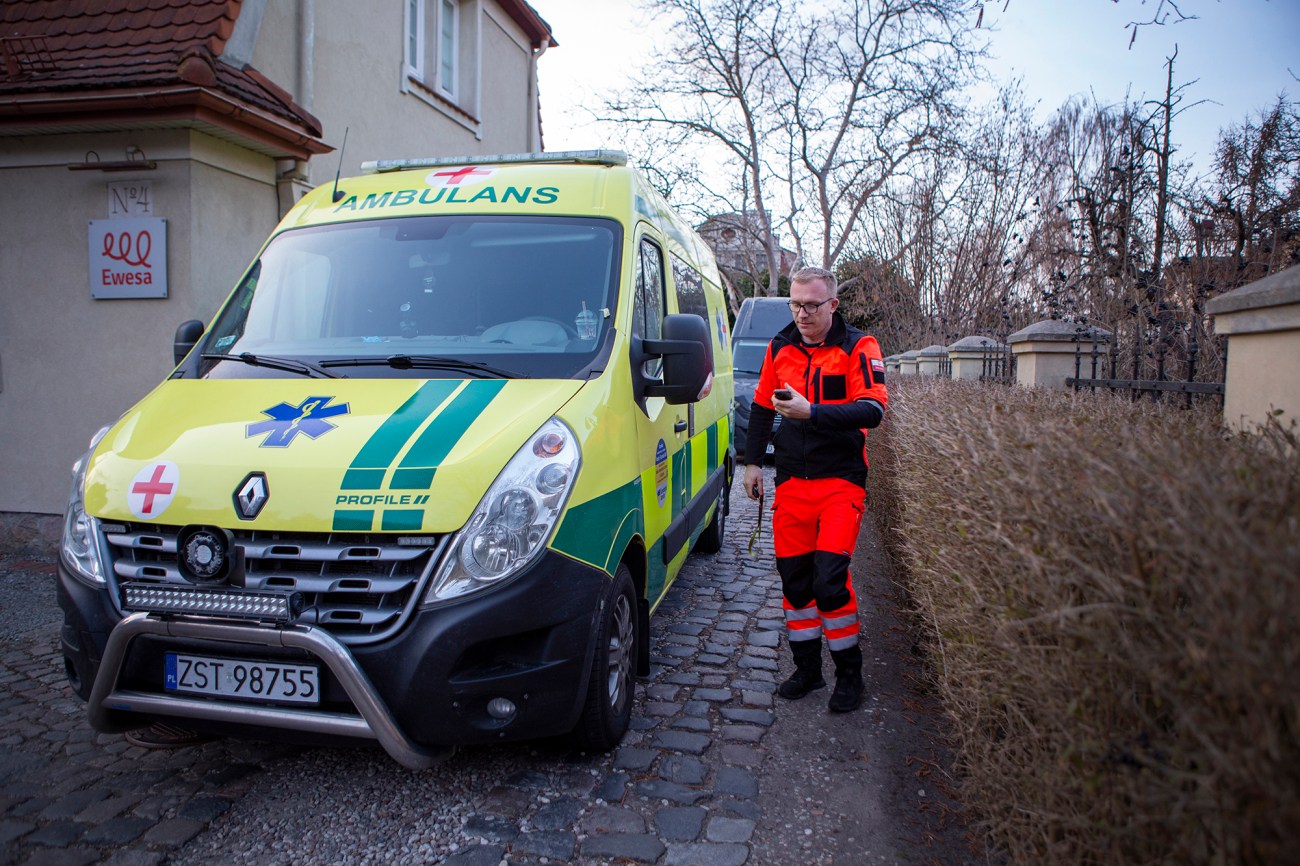
Kryspin Dzwonek and his ambulance.
Peter Balonon-Rosen
Kryspin is Ewelina Sasin’s older brother, five years her senior, and works as an ambulance driver, lifeguard, and volunteer firefighter in Gdańsk. He’s the kind of person who likes to race fast motorbikes and jump out of planes. Ewelina jokes that Kryspin is missing the piece of his brain where most people process fear. We all met up in Ewelina’s bright offices, out of which she runs her two companies. Budgets and brainstorming ideas cover every inch of a white wall. Kryspin pulled up to the office in an ambulance that, by a strange twist of fate, he now drives to Ukraine every few weeks.
He started work when the war began. With a friend and a borrowed ambulance, he drove into Ukraine with a friend and rescued two mothers and two children from hospitals, and brought them to Poland. This trip lit a fire in Kryspin. He saw how many people in Ukraine needed help—especially those who were vulnerable and ill—and told Ewelina that he wanted to make more trips and evacuate more sick children.
The person in her extensive network Ewelina turned to was her friend, Marta Glik. She told her that her brother was interested in buying an ambulance in order to drive to Ukraine. Marta Glik’s husband happens to be Kamil Glik, a famous Polish soccer star who plays on the national team. Marta convinced her husband to buy the ambulance while Ewelina got her children’s school charity to cover the taxes. Their school, the British International School of Gdańsk (BISG), funds the cost of Kryspin’s trips to Ukraine. Each trip costs between $1,400 and $1,800 just for fuel. It is impossible to get insurance in war zones, so they will be responsible for any accidents or damage. Kryspin wears a bulletproof vest and helmet.
On Kryspin’s first trip in the new ambulance, he rescued 7-day-old Croatian twins who were born in a bomb shelter near Kyiv. They secured them a shelter near Warsaw, then took them to an airport so they could fly to Croatia. He also rescued two children who were cancer patients in Lviv and found spots for them in a Polish hospital.
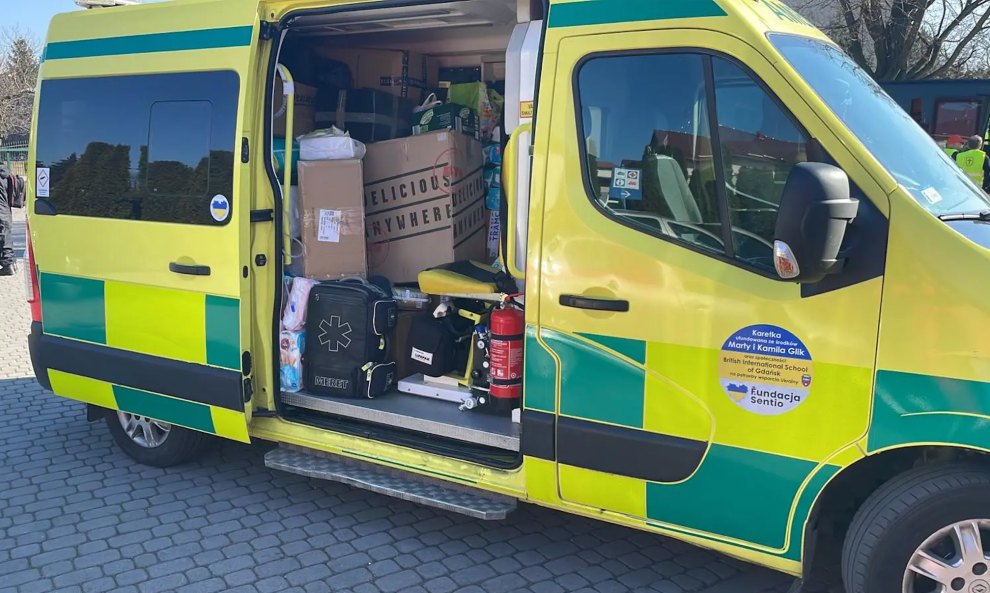
The new ambulance that has made regular trips to Ukraine, loaded with supplies to donate to hospitals there.
Photo courtesy of Ewelina Sasin
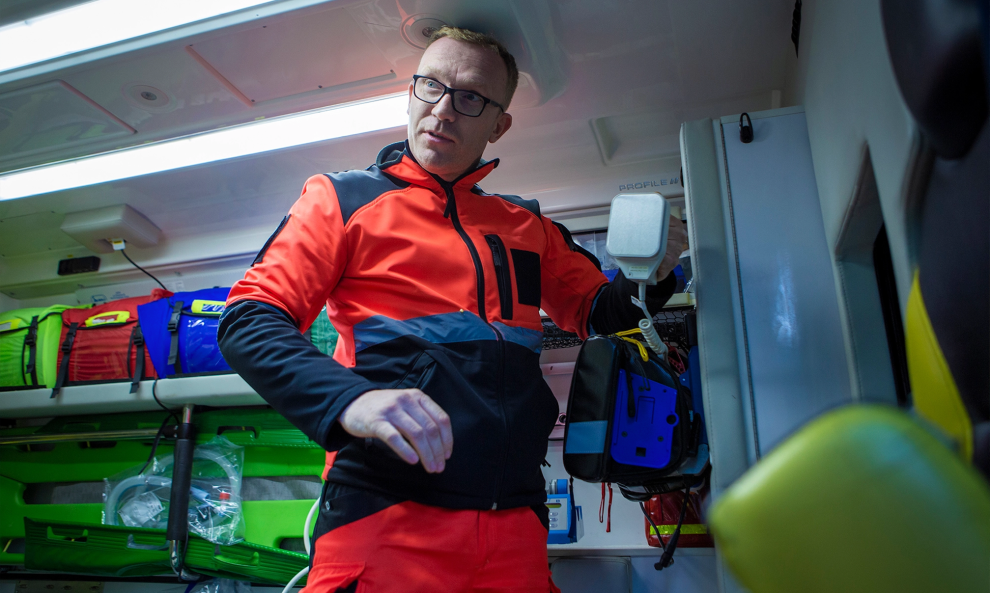
Kryspin Dzwonek shows the equipment in the ambulance he uses to make regular rescue trips to Ukraine.
Peter Balonon-Rosen
Since then, Kryspin has made two more trips, each for a week at a time. During these stretches, he travels back and forth over the border from hospital to hospital, from Lviv to Przemyśl to Lublin to Tarnov to Rzeszów. One time he evacuated a girl who had jumped from a window and broke her spine after her building was bombed. Every time the ambulance makes a trip to Ukraine, Ewelina and her fellow volunteers fill it with medical equipment, diapers, and other supplies that Kryspin delivers to hospitals. They have been especially asking for thermal blankets and hydro bandages.
BISG has been extremely proficient at fundraising, bringing in over $78,000 so far. Some of the Ukrainian parents at the school would like to spend that money to help fund Ukraine’s military, but Ewelina and other parents have opposed the idea.
“We are a school, we cannot buy military protective gear. But we can help with medical equipment and take care of people,” she says. “We want to spread love.”
As we were sitting in Ewelina’s brightly colored office, Kryspin received a message from a woman who works for the Red Cross. She was asking if he could take a girl from Poland to Lviv. Two weeks ago, Kryspin evacuated this same girl, who has terminal cancer, to an oncology unit in Lublin. Now, she has decided that she wants to die in Ukraine.

When I met Tanya, Diana Kyrychyk’s sister-in-law, on April 1, she too was contemplating returning to Ukraine. “It’s really sad that she’s without her husband,” says Diana. That’s the case for many women in Poland who have fled. For the first time since the crisis began, Poland’s border guards are seeing more people leaving Poland for Ukraine than are crossing from Ukraine to Poland. At first, Diana and Dima didn’t know what their next plans were. They’ve had many discussions about moving to places where they have relatives, like France, Germany, Norway, Slovakia, or the Czech Republic. When I met them, they told me they’d wait in Poland. They were hoping that the war would end soon.
“I think this war has changed everyone,” Dima says. “This relationship between Ukrainians and Russians was very deep, and now it’s like an open wound.”
But all that changed. On April 13, the Kyrychyks left the apartment in Gdańsk. Tanya returned to Ukraine with her baby to be with her husband, Diana’s brother. But Diana, Dima, and their three kids managed to take advantage of a special immigration program to the US.
They had applied five years ago for a program run through the World Relief Fund to provide refugee visas to the United States for residents of former Soviet states. This predated the initiative that offered 100,000 spots for refugees, but has been slow getting started. Under that program, the US processed only 12 Ukrainian refugees in March. Diana and Dima were worried that their visas could be delayed up to a couple of years because of the war. But in early April, somehow, everything came through.
The United States wasn’t even on Diana and Dima’s list of potential places when I met them on April 1, which just goes to show how utterly unpredictable their life has become. By the middle of the month, the whole family was on a plane to Sacramento, California, to start a new life there. Even though they are grateful that their visas came through, the circumstances have been unimaginably difficult. Diana says that since the war started, she and Dima have been crying a lot more than normal. They’ve also been praying a lot more than usual and having many tearful, often distant, goodbyes with their beloved parents, sisters, brother, relatives, and friends. “We were worrying a lot about the uncertainty we must step into with three small kids,” she says. “Russians have stolen our happy and peaceful life from us, our families and friends.”
